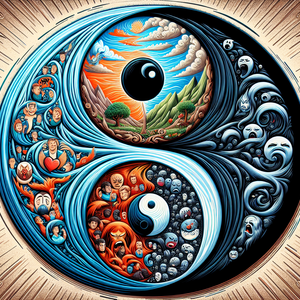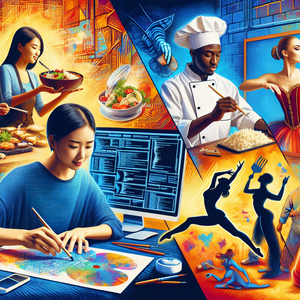The Art of Unlearning: A Lifelong Skill in an Era of Change

At its core, unlearning is the process of letting go of outdated information, habits, or beliefs to create space for new ideas and ways of thinking. It’s not about forgetting what you know, but rather about questioning its relevance in light of current realities. For example, consider the rise of digital tools and automation in the workplace. A professional trained in traditional office management might find their skills less relevant in a world dominated by project management software, remote work platforms, and artificial intelligence. To stay competitive, they must unlearn old methods of working—such as paper-based organization—and embrace new, tech-driven approaches. Unlearning matters because clinging to outdated practices can hinder growth and innovation. In both personal and professional contexts, it limits one’s ability to adapt to change and seize new opportunities. In contrast, individuals and organizations that embrace unlearning are better equipped to pivot, learn new skills, and remain relevant in an evolving world.
The Connection Between Unlearning and Lifelong Learning
The concept of unlearning is deeply intertwined with lifelong learning. Lifelong learning emphasizes the continuous acquisition of knowledge and skills throughout an individual’s life. However, adding new knowledge without re-examining and shedding outdated beliefs can create mental clutter. This is where unlearning comes in—it clears the way for meaningful and relevant learning to take place. For instance, the rise in-demand skills such as coding, data analysis, and emotional intelligence illustrates how unlearning is necessary for professional growth. A marketer who once relied solely on intuition to guide campaigns must now unlearn this approach and embrace data-driven decision-making. Similarly, a leader who operated under a hierarchical “command and control” model may need to unlearn these behaviors to adopt more inclusive and collaborative leadership styles. Unlearning and lifelong learning, when practiced together, create a powerful cycle of growth. While lifelong learning helps individuals acquire new skills, unlearning ensures they remain flexible and open to change.
Why the Art of Unlearning Is Critical in the 21st Century
The rapid pace of technological and societal transformation makes unlearning more urgent than ever. The Fourth Industrial Revolution, driven by advancements in artificial intelligence, robotics, and digital connectivity, is reshaping industries and creating entirely new job categories. Many of the skills people relied on in the past are no longer sufficient—or even relevant—today. Automation and artificial intelligence are transforming workplaces, requiring employees to unlearn manual processes and embrace tech-driven workflows. For example, consider the accounting profession. Tasks like basic bookkeeping, once performed manually, have been largely automated through software like QuickBooks and Xero. Accountants who fail to unlearn their reliance on manual methods risk falling behind in a field now prioritizing analytical skills, strategic planning, and financial forecasting. Unlearning isn’t just limited to professional skills; it also applies to personal beliefs and behaviors. As society evolves, individuals are called to critically examine biases and stereotypes they may have internalized over time. For instance, workplaces are placing a growing emphasis on diversity, equity, and inclusion (DEI). Employees who unlearn unconscious biases and adopt inclusive behaviors contribute to more harmonious and productive work environments. As industries evolve, the demand for in-demand skills shifts. Ten years ago, careers in social media marketing and digital content creation were relatively niche. Today, they are indispensable. Professionals who failed to unlearn outdated marketing strategies—like print-only campaigns—have struggled to keep up. Meanwhile, those who embraced unlearning and adapted to the digital age have found themselves in high demand.
How to Master the Art of Unlearning
Just as learning requires effort and strategy, so does unlearning. The good news? Unlearning is a skill that can be cultivated over time. Here are five practical steps to help you master the art: 1. Adopt a Growth Mindset: Unlearning begins with the belief that growth is always possible. A growth mindset allows you to see change as an opportunity rather than a threat. By embracing the idea that no knowledge or skill is ever “final,” you’ll be more open to unlearning outdated practices. 2. Question Assumptions: Challenge the beliefs and habits you’ve taken for granted. For example, ask yourself: “Why do I do things this way? Is there a better or more efficient method available now?” Questioning assumptions is key to identifying areas ripe for unlearning. 3. Embrace Feedback: Sometimes, we’re blind to the habits or beliefs that are holding us back. Seeking feedback from mentors, peers, or even subordinates can provide valuable insights into what you might need to unlearn. 4. Experiment with New Approaches: Unlearning often involves stepping into the unknown. Whether it’s trying a new tool, adopting a different workflow, or rethinking your communication style, experimentation can help you break free from old patterns. 5. Commit to Lifelong Learning: Remember that unlearning and learning go hand in hand. The more you expose yourself to new knowledge, the easier it becomes to let go of outdated ideas. Use resources like online courses, books, podcasts, and professional development programs to stay informed and adaptable.
Real-World Examples of Unlearning in Action
To illustrate the transformative power of unlearning, let’s look at two real-world examples: Blockbuster vs. Netflix: Blockbuster, once the dominant leader in the video rental industry, failed to unlearn its dependence on physical stores and late fees. Meanwhile, Netflix embraced unlearning by transitioning from DVD rentals to a streaming model, eventually revolutionizing the entertainment industry. Elon Musk’s Approach to Innovation: Elon Musk’s ventures in electric vehicles (Tesla) and space exploration (SpaceX) are prime examples of unlearning in action. Musk has often spoken about “first principles thinking,” which involves stripping problems down to their fundamental truths and building solutions from the ground up. This mindset requires unlearning conventional approaches to innovation.
In an age of constant change, the art of unlearning has become a critical skill for personal and professional success. It’s no longer enough to accumulate knowledge and skills—you must also be willing to let go of what no longer serves you. Unlearning clears the path for lifelong learning, ensuring that you remain adaptable, relevant, and ready to tackle new challenges. By adopting a growth mindset, questioning assumptions, and embracing experimentation, you can master the art of unlearning and position yourself for success in an ever-evolving world. As Alvin Toffler famously stated, “The illiterate of the 21st century will not be those who cannot read and write, but those who cannot learn, unlearn, and relearn.” So, take a moment to reflect: What are you ready to unlearn today?
Organizational Change Manager
Consulting firms (e.g., Deloitte, McKinsey), multinational corporations, and technology companies transitioning to new platforms
Responsibilities
Lead change management strategies to help businesses transition during mergers, digital transformations, or organizational restructuring.
Collaborate with leadership to identify outdated practices and implement modern, agile workflows.
Develop and deliver training programs to help employees unlearn legacy systems and adopt new tools or processes.
Learning & Development (L&D) Specialist
Large organizations (e.g., Google, Microsoft), HR consultancies, or educational technology companies
Responsibilities
Design and execute training programs focusing on continuous learning and the unlearning of outdated professional habits.
Use data-driven methods to assess workforce skill gaps and create targeted upskilling or reskilling initiatives.
Introduce modern learning technologies like AI-driven platforms or microlearning tools to replace traditional training methods.
Digital Transformation Consultant
Technology firms (e.g., Accenture, IBM), startups, or enterprises undergoing digital modernization
Responsibilities
Guide companies in unlearning legacy systems and adopting cloud-based or AI-driven technologies to streamline operations.
Analyze workflows to identify inefficiencies and recommend innovative tools or processes.
Provide change management support to ensure smooth adoption of new digital platforms.
Diversity, Equity, and Inclusion (DEI) Strategist
Corporations, non-profits, and consulting firms specializing in workplace culture transformation
Responsibilities
Help organizations unlearn unconscious biases and implement inclusive hiring, retention, and promotion practices.
Develop training programs to educate teams on cultural competency, allyship, and equitable workplace behaviors.
Conduct audits of company policies to ensure alignment with modern DEI standards.
Workforce Reskilling Program Manager
Government agencies, global corporations, or workforce development organizations (e.g., Coursera, General Assembly)
Responsibilities
Design and manage large-scale programs to help employees transition into new roles or industries by unlearning outdated skills.
Partner with educational institutions and online learning platforms to deliver targeted courses in areas like data analytics, AI, or programming.
Monitor the effectiveness of reskilling efforts through metrics like job placement rates or employee retention.


